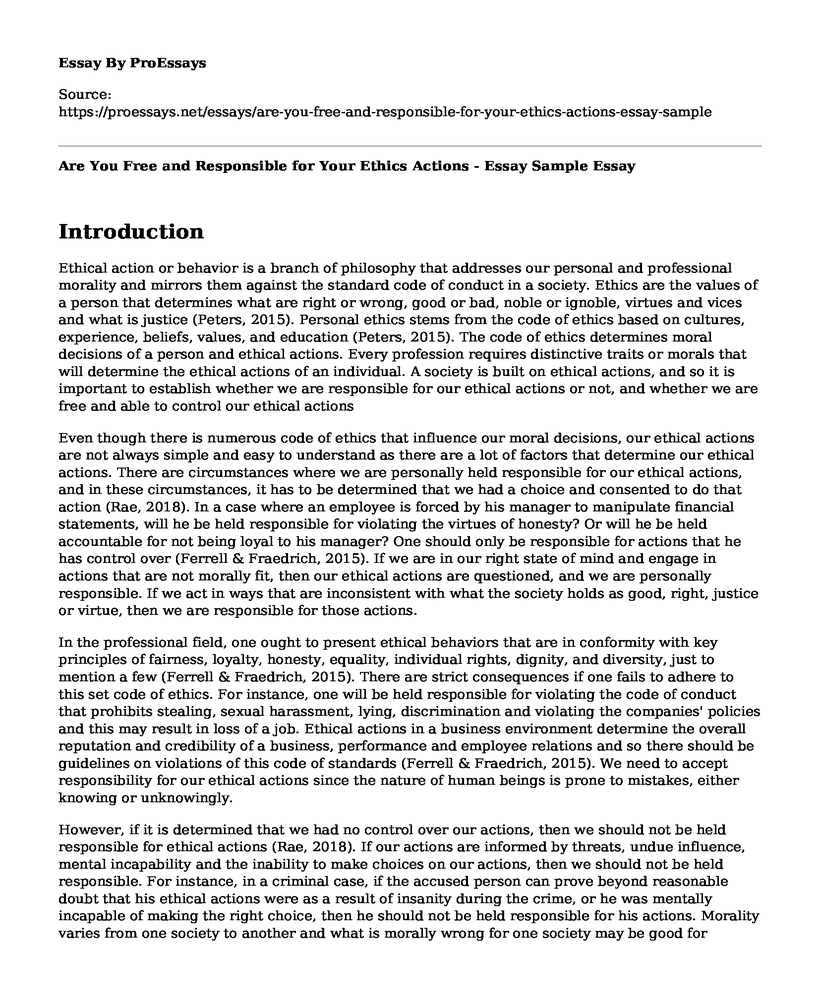Introduction
Ethical action or behavior is a branch of philosophy that addresses our personal and professional morality and mirrors them against the standard code of conduct in a society. Ethics are the values of a person that determines what are right or wrong, good or bad, noble or ignoble, virtues and vices and what is justice (Peters, 2015). Personal ethics stems from the code of ethics based on cultures, experience, beliefs, values, and education (Peters, 2015). The code of ethics determines moral decisions of a person and ethical actions. Every profession requires distinctive traits or morals that will determine the ethical actions of an individual. A society is built on ethical actions, and so it is important to establish whether we are responsible for our ethical actions or not, and whether we are free and able to control our ethical actions
Even though there is numerous code of ethics that influence our moral decisions, our ethical actions are not always simple and easy to understand as there are a lot of factors that determine our ethical actions. There are circumstances where we are personally held responsible for our ethical actions, and in these circumstances, it has to be determined that we had a choice and consented to do that action (Rae, 2018). In a case where an employee is forced by his manager to manipulate financial statements, will he be held responsible for violating the virtues of honesty? Or will he be held accountable for not being loyal to his manager? One should only be responsible for actions that he has control over (Ferrell & Fraedrich, 2015). If we are in our right state of mind and engage in actions that are not morally fit, then our ethical actions are questioned, and we are personally responsible. If we act in ways that are inconsistent with what the society holds as good, right, justice or virtue, then we are responsible for those actions.
In the professional field, one ought to present ethical behaviors that are in conformity with key principles of fairness, loyalty, honesty, equality, individual rights, dignity, and diversity, just to mention a few (Ferrell & Fraedrich, 2015). There are strict consequences if one fails to adhere to this set code of ethics. For instance, one will be held responsible for violating the code of conduct that prohibits stealing, sexual harassment, lying, discrimination and violating the companies' policies and this may result in loss of a job. Ethical actions in a business environment determine the overall reputation and credibility of a business, performance and employee relations and so there should be guidelines on violations of this code of standards (Ferrell & Fraedrich, 2015). We need to accept responsibility for our ethical actions since the nature of human beings is prone to mistakes, either knowing or unknowingly.
However, if it is determined that we had no control over our actions, then we should not be held responsible for ethical actions (Rae, 2018). If our actions are informed by threats, undue influence, mental incapability and the inability to make choices on our actions, then we should not be held responsible. For instance, in a criminal case, if the accused person can prove beyond reasonable doubt that his ethical actions were as a result of insanity during the crime, or he was mentally incapable of making the right choice, then he should not be held responsible for his actions. Morality varies from one society to another and what is morally wrong for one society may be good for another society (Rae, 2018). A person may not be liable for his ethical actions if it is proved that he had no knowledge that particular action was morally wrong.
Conclusion
In conclusion, ethics are the core foundations of any society and create balance and stability for the existence of people. Ethics are dictated by our values, cultures, virtues, experience, and education just to mention a few. It is important to determine whether we are responsible for our ethical actions or not? The choice and free will to do certain actions will determine whether we should be held responsible or not. Factors that influence us negatively such as duress, threats, and mental incapacities on our ethical actions should be excused, and we should not be held responsible in such cases.
References
Ferrell, O. C., & Fraedrich, J. (2015). Business ethics: Ethical decision making & cases. Nelson Education.
Peters, R. S. (2015). Ethics and Education (Routledge Revivals). Routledge.
Rae, S. (2018). Moral choices: An introduction to ethics. Zondervan.
Cite this page
Are You Free and Responsible for Your Ethics Actions - Essay Sample . (2022, Oct 19). Retrieved from https://proessays.net/essays/are-you-free-and-responsible-for-your-ethics-actions-essay-sample
If you are the original author of this essay and no longer wish to have it published on the ProEssays website, please click below to request its removal:
- Sociology Essay Example: Agents of Socialization
- Summary of Read-Only Participants: A Case for Student Communication in Online Classes
- Essay Example on God Bless the Child: US Response to Juvenile Prostitution
- Annotated Bibliography: Matrilineal vs. Patriarchal Cultures: Gender Risk Aversion Impact
- Mother-Son Bond in We Need to Talk About Kevin - Essay Sample
- Essay Example on Child Abuse & Maltreatment: A Global Problem
- "The Distance between US" Cultural and Immigration Trauma - Free Essay







